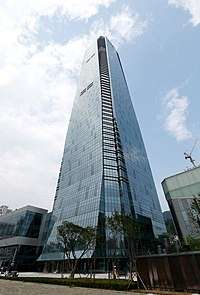Korea Exchange
Korea Exchange (KRX) is the sole securities exchange operator in South Korea. It is headquartered in Busan, and has an office for cash markets and market oversight in Seoul.
| 한국거래소 | |
 | |
| Type | Stock exchange |
|---|---|
| Location | Busan & Seoul, South Korea |
| Coordinates | 35°08′12″N 129°03′53″E (Busan) |
| Founded | 27 January 2005(Establish 1956) |
| Key people | Jiwon Jung (CEO / Chairman) |
| Currency | South Korean won |
| No. of listings | 2,354 (as of May 2020)[1] |
| Market cap | 1,566 Trillion KRW |
| Indices | KOSPI KOSDAQ KRX 100 |
| Website | www eng |
| Korea Exchange | |
| Hangul | 한국거래소 |
|---|---|
| Hanja | 韓國去來所 |
| Revised Romanization | Hanguk Georaeso |
| McCune–Reischauer | Hanguk Kŏraeso |
History
The Korea Exchange was created through the integration of Korea Stock Exchange, Korea Futures Exchange and KOSDAQ Stock Market under the Korea Stock & Futures Exchange Act. The securities and derivatives markets of former exchanges are now business divisions of Korea Exchange: the Stock Market Division, KOSDAQ Market Division and Derivatives Market Division. As of May 2020, Korea Exchange had 2,354 listed companies with a combined market capitalization of $1.56 trillion KRW. The exchange has normal trading sessions from 09:00 am to 03:30 pm on all days of the week except Saturdays, Sundays and holidays declared by the Exchange in advance.[2]
On 22 May 2015, the Korea Exchange joined the United Nations Sustainable Stock Exchanges initiative in an event with the UN-SG Ban Ki-moon in attendance, as well as senior officials from UN Global Compact and UNCTAD.[3]
Traded Instruments
- KOSPI Market Division
- Stocks
- Bonds
- Exchange Traded Funds (ETFs)
- Exchange-Linked Warrants (ELWs)
- Real Estate Investment Trusts (REITs)
- KOSDAQ Market Division
- Stocks
- Derivatives Market Division
- Index Instruments: KOSPI 200 Index Futures, KOSTAR Futures, KOSPI 200 Index Options
- Single Stock Futures
- Equity Options
- Interest Rate Instruments: 3-Year KTB (Korea Treasury Bond) Futures, 5-Year KTB Futures, 10-Year KTB Futures
- Foreign Exchange Instruments: USD Futures, JPY Futures, EUR Futures, USD Options
- Commodity Instruments: Gold Futures, Mini-gold Futures, Lean Hog Futures
See also
- Korea Financial Investment Association
- List of East Asian stock exchanges
References
- ""Global KRX About KRX KRX Overview History"". Retrieved 18 May 2020.
- Market Hours, Korea Exchange via Wikinvest
- "UN Secretary-General Joins Business Leaders in Seoul, Calls for Urgent Action on Poverty, Climate Change and Conflict". UN Global Compact. UN Global Compact. Retrieved 23 May 2015.